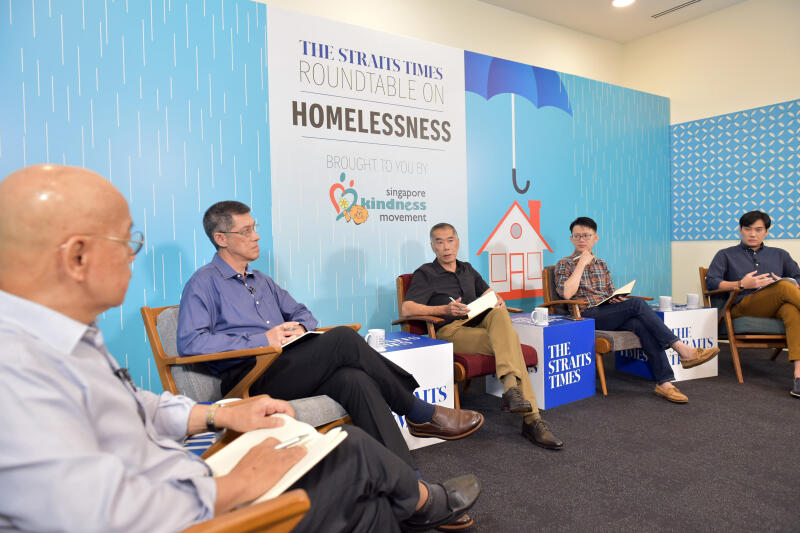Whole-of-community approach needed to help Singapore's homeless: Expert panel
Sign up now: Get ST's newsletters delivered to your inbox

(From left) Singapore Kindness Movement general secretary William Wan, Peers Office senior director Lee Kim Hua, New Hope Community Services chief executive Andrew Khoo, Homeless Hearts of Singapore co-founder Abraham Yeo and National University of Singapore post-doctoral research fellow Harry Tan.
PHOTO: NG YEOW KIN
SINGAPORE - The community as a whole needs to be involved to help the homeless stay off the streets, said panellists in a discussion about the issue on Tuesday (March 24).
Individuals, businesses and organisations should be encouraged to share their resources in addition to volunteer groups and government and social service agencies in the Partners Engaging and Empowering Rough Sleepers (Peers) network that was launched last year, they said.
Mr Lee Kim Hua, senior director of the Peers office at the Ministry of Social and Family Development, noted that those who had offered temporary lodging to displaced Malaysian workers affected by their country's partial lockdown could also help the 1,000 or so homeless people here find shelter.
The two groups are distinct, as the Malaysian workers will have a home to return to when the border restrictions are lifted, he added.
Mr Lee called on experts such as psychiatrists, therapists and counsellors to help the homeless rebuild relationships and improve their family situations.
He also encouraged companies, apart from donating money, to open their premises and facilities to house perhaps 10 or 20 homeless people at night, and encourage their employees to volunteer.
Mr Lee was a panellist in the discussion organised by The Straits Times in partnership with the Singapore Kindness Movement (SKM). It was moderated by SKM general secretary William Wan.
The other panellists were Homeless Hearts of Singapore co-founder Abraham Yeo, Mr Harry Tan, a post-doctoral research fellow in the department of sociology at the National University of Singapore, and New Hope Community Services chief executive Andrew Khoo.
They discussed their experiences helping the homeless and looked at the various reasons for homelessness here.
While the panellists acknowledged that there is no single reason, Pastor Khoo, who has been helping the homeless for more than 15 years, said: "Generally, people who are homeless are those who are without family support. If the family is supportive, they would have gone back home."
They also debunked common stereotypes of the homeless as being lazy and unmotivated, and that they had chosen to be on the streets.
Mr Tan said that many homeless people may say they chose to sleep rough because of work proximity or conflict at home but these may not really be choices but instead reflect the limitations they face.
He said: "It shows a lack of available options to (these) people that they have to sleep outside."
A whole-of-community approach to tackling homelessness is vital, said Mr Yeo, who also emphasised the importance of building a relationship with homeless people.
Mr Yeo cited the case of a homeless man he had met who was initially suspicious and curt, only saying hello when volunteers came by. One night, he drew Mr Yeo aside to tell him he wanted to change his life.
When asked why, the man said it was because he felt the love from Mr Yeo and the volunteers, who kept coming back to visit him.
Dr Wan noted in his closing remarks that it is not enough to help people get out of homelessness, but to also stay out of it.
He said: "It's everybody's problem and cannot be simply resolved by just giving them a place and then walk away.
"We need to stay with them, work with them and walk with them."
There will be more articles on the panel's discussions in next Monday's edition of The Straits Times.


